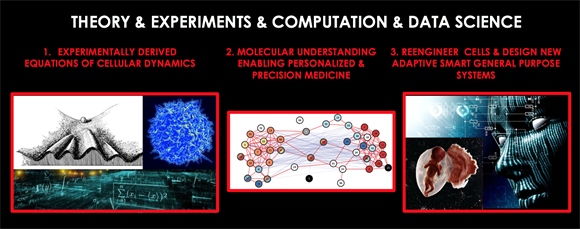Interdisciplinary publications
Can fundamental algorithmic information theory augment finding causal needles hidden in a heystack of a complex web of interactions?
Seminars in Development and Cell Biology, 2016
How to decode and dismantle pathogenic human immune T-cells?
Frontiers in Immunology 2016
Why do you have a limited short-term memory capacity?
Proceedings of National Academy of Sciences, 2009
If your cells are more reprogrammable would you be less susceptible for immune related diseases?
Nature Communications, 2015
If you can read the products of the genome, can you figure out the system if you also can write parts of the genome?
Proceedings of National Academy of Sciences, 2003
How different from a mouse are you really?
Cell, 2010
Can you reprogram your genes in the gym?
Epigenetics, 2014
Can you avoid getting lost in translation of hideously non-linear nested dynamics equations by surgical dissections?
IET Systems Biology, 2016
Is vitamin D good for you, less risk of Multiple Sclerosis?
Proceedings of National Academy of Sciences, 2017
In the sea of discrete big data, can we crack the underlying NP-complete problem and find the relevant features?
Journal of Machine Learning Research, 2007
Overview

We are fundamentally intrigued by living systems. Since cells are the fundamental units of life we focus on developing and applying experimental and computational techniques for decoding the dynamics of cellular regulatory circuits. To increase the resolution of those circuits our current focus is on single cell genomics using cell culture experiments and computational techniques.
This is relevant for addressing vital questions related to the control of cellular identity, reprogramming of cells, as well as biomedical applications.
On the theory side this endeavor requires new algorithms and machine intelligence approaches for essentially extracting the fundamental equations encoding causality directly from data. Living systems have a stunning capacity to learn, represent, predict, and in extension “understand” their local world(s) over time. In our work we believe that evolved solutions in nature can provide fresh clues on how to design new powerful intelligent hybrid computational systems.
News
Exploring bioinformatics @ KAUST
01 November, 2019
DNA and RNA are fundamental molecules encoding the building plan of every living organism. Sequencing methods for DNA and RNA have become ubiquitous tools for the life sciences and healthcare. For example, sequencing has opened up entirely new avenues of research in diverse fields, such as the study of evolution or the understanding of the molecular mechanisms of complex diseases like cancer.
Thermodynamics of network coding and reprogramming systems – refining the principle of maximum entropy using algorithmic complexity – published in Entropy
01 June, 2019
The principle of maximum entropy (Maxent) is often used to obtain prior probability distributions as a method to obtain a Gibbs measure under some restriction giving the probability that a system will be in a certain state compared to the rest of the elements in the distribution...
Analysis of DNA methylation in post-mortem brains from Multiple Sclerosis patients – published in Clinical Epigenetics
01 May, 2019
Multiple sclerosis (MS), a leading cause of neurological disability in young adults, is a chronic inflammatory and neurodegenerative disease of the central nervous system (CNS) characterized by autoimmune destruction of myelin and subsequent neuronal death...
